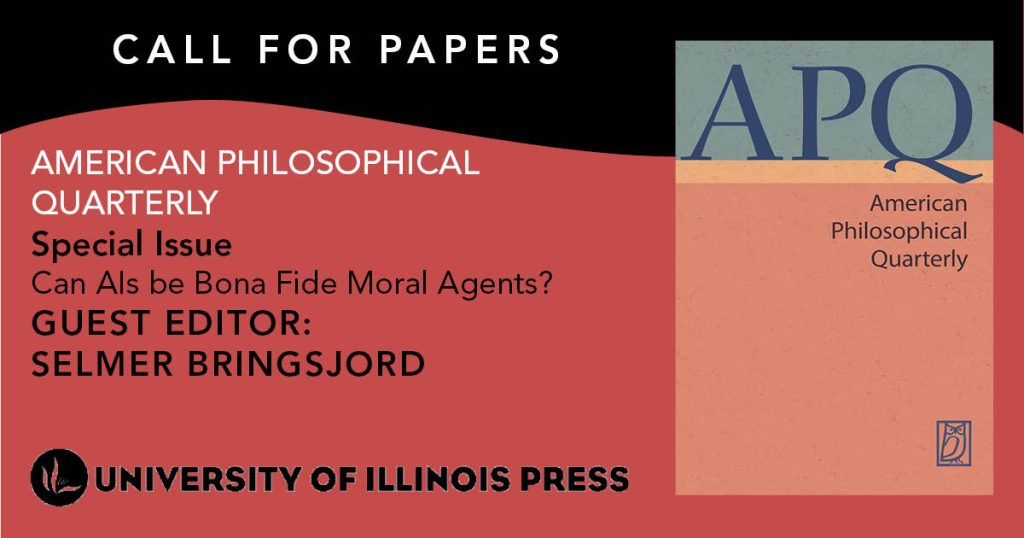
American Philosophical Quarterly is seeking submissions for two upcoming special issues related to philosophical questions surrounding artificial intelligence:
- The Ethics of Artificial Intelligence
- Guest Editor: Luciano Floridi
- Submission Deadline: July 31, 2023
- Can AIs Be Bona Fide Moral Agents
- Guest Editor: Selmer Bringsjord
- Submission Deadline: August 15, 2023
Below are the full details on the themes, questions, and submission processes. For an already published special issue you can read now, check out “Naturalism and Metaphysics,” guest edited by Mirco Sambrotta.
SPECIAL ISSUE: THE ETHICS OF ARTIFICIAL INTELLIGENCE
Editor in Chief: Patrick Grim
Guest Editor: Luciano Floridi
Artificial Intelligence (AI), from machine learning to robotics, generates enormous opportunities and significant challenges. In the past few years, many of them have led to a flourishing of international initiatives and growing research concerning the ethics and governance of AI. This special issue solicits the submission of original articles that investigate how AI is transforming classic questions or leading to new ones in moral thinking, and how such questions may be addressed successfully. Topics of special interest include but are not limited to AI and: authenticity, creativity, and intellectual property rights; bias, discrimination and fairness; the digital divide; digital sovereignty; capabilities and empowerment; cyberconflicts and cybersecurity; fake news and deep fakes; ethical frameworks and principles; ethics-base auditing; human autonomy and self-determination; sustainability and sustainable development goals.
All approaches, methodologies, and schools of thought are welcome, with particular attention to sound and evidence-based reasoning. Purely historical or speculative articles are not encouraged.
To submit a paper for this special issue, authors should send an email including name, surname, academic affiliation and preferred email in the body of the email and the submitted article, fully anonymised, in word format, as an attachment to:
Elisabetta Bulla
Centre for Digital Ethics
University of Bologna
segreteria.amministrativa.cde@gmail.com
The deadline is July 31, 2023.
SPECIAL ISSUE: CAN AIS BE BONA FIDE MORAL AGENTS?
Editor in Chief: Patrick Grim
Guest Editor: Selmer Bringsjord
Human agents now share their world with non-trivial artificial agents, and some of the latter undeniably of late match (at least average) human performance in many domains. For example, the artificial agents ChatGPT and Galactica can instantly write entire essays of at least considerable eloquence, and the Academy is currently grappling with how work from human students can be distinguished from “work” provided by the likes of such artificial agents. In that discussion it is generally assumed that it would be immoral for a human student to submit an AI-authored essay as if it were written by said human. Now, some of today’s artificial agents will, upon being suitably prompted, rather volubly generate prose about ethics; but (Q) can artificial agents be genuine moral agents themselves? This question is the basis for the special issue. Of course, the question here has nothing in particular to do with cheating: any and all “ethically charged” behaviors in the human sphere may be worth considering in connection with Q.
Only papers that specifically and deeply wrestle with the driving question Q will be considered. Those wishing to deal in an APQ paper with vast and varied philosophical issues arising from and intertwined with AI (e.g., authenticity, creativity, and intellectual property rights; bias, discrimination and fairness; the digital divide; digital sovereignty; capabilities and empowerment; etc.) other than Q are encouraged to submit a paper for related special issue edited by Luciano Floridi.
To submit a paper for this special issue, authors should send an email including name, surname, academic affiliation and preferred email in the body of the email, and the submitted article, anonymized, in pdf format, as an attachment to:
Selmer Bringsjord
Department of Cognitive Science, Department of Computer Science, RPI
Selmer.Bringsjord@gmail.com
The deadline is August 15, 2023.
